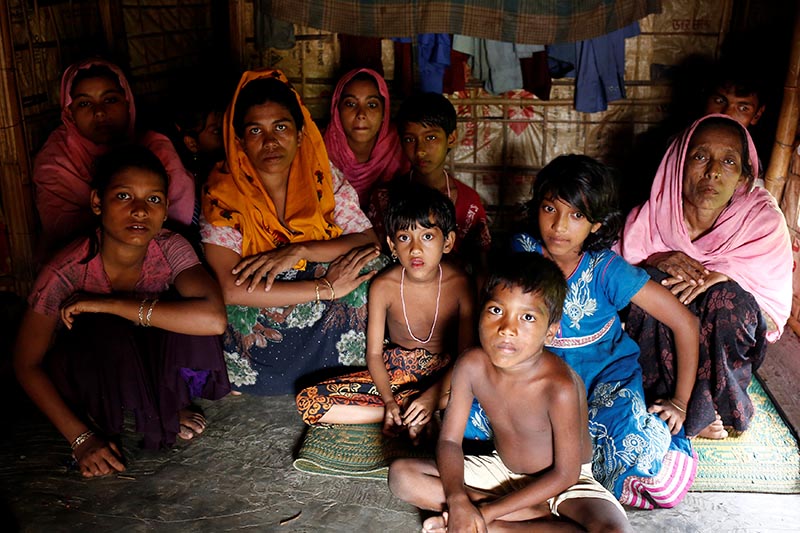Thousands of non-Muslims evacuated as violence flares in northwest Myanmar
- Observers highlight widespread nature of Rohingya attacks
- Death toll after attacks climbs to 98
- Thousands of Rohingya cross to Bangladesh
YANGON/COX'S BAZAR: Myanmar's government said it has evacuated at least 4,000 non-Muslim villagers amid ongoing clashes in northwestern Rakhine state, as thousands more Rohingya Muslims sought to flee across the border to Bangladesh on Sunday.
The death toll from the violence that erupted on Friday with coordinated attacks by Rohingya insurgents has climbed to 98, including some 80 insurgents and 12 members of the security forces, the government said.
Fighting involving the military and hundreds of Rohingya across northwestern Rakhine continued on Saturday with the fiercest clashes taking place near the major town of Maungdaw, according to residents and the government.
Bracing for more violence, thousands of Rohingya - mostly women and children - were trying to forge the Naf river separating Myanmar and Bangladesh and the land border. Reuters reporters at the border could hear gunfire from the Myanmar side on Sunday.
Around 2,000 people have been able to cross into Bangladesh since Friday, according to estimates by Rohingya refugees living in the makeshift camps on the Bangladeshi side of the border.
The violence marked a dramatic escalation of a conflict that has simmered in the region since last October, when a similar but much smaller Rohingya attack prompted a brutal military operation beset by allegations of serious human rights abuses.
While the chaos and lack of access made detailed assessments difficult, experts said the latest attacks were so widespread they appeared to be more akin to a movement or an uprising, rather than a regular insurgent offensive.
One army source said the military was also struggling to differentiate.
"All the villagers become insurgents, what they're doing is like a revolution," said the source in Rakhine. "They don't care if they die or not. We can't tell who of them are insurgents."
CHALLENGE FOR SUU KYI
The treatment of approximately 1.1 million Muslim Rohingya in mainly Buddhist Myanmar has emerged as the biggest challenge for national leader Aung San Suu Kyi. Suu Kyi on Friday condemned the raids in which insurgents wielding guns, sticks and homemade bombs assaulted 30 police stations and an army base.
The Nobel Peace Prize laureate has been accused by some Western critics of not speaking out for the long-persecuted Muslim minority.
Win Myat Aye, Myanmar's minister for social welfare, relief and resettlement, told Reuters late on Saturday that 4,000 "ethnic villagers" who had fled their villages had been evacuated, referring to non-Muslim residents of the area.
The ministry is arranging facilities for them in places including Buddhist monasteries, government offices and local police stations in major cities.
"We are providing food to the people cooperating with the state government and local authorities," said Win Myat Aye. He was unable to describe the government's plans to help Rohingya civilians.
Rakhine residents in ethnically mixed or non-Muslim towns have readied knives and sticks to defend themselves. Many were stranded in their villages located in Muslim-majority areas as clashes continued and some roads had been mined, residents said.
People from Maungdaw and another town, Buthidaung, said on Sunday they worried food supply routes had been temporarily cut off.
"Buthidaung will face shortages of food, because no ships have arrived since the fighting started. It is also difficult to send food to the villagers stuck in other areas," Arakan National Party regional lawmaker, Tun Aung Thein, told Reuters by telephone from the town.
"BREAKING POINT"
The Myanmar army operation following attacks last year was heavily criticised internationally amid reports of civilian killings, rape and arson that a United Nations investigation said probably constituted crimes against humanity. Suu Kyi is blocking the U.N.-mandated probe into the allegations.
The Rohingya have for years endured apartheid-like conditions in northwestern Myanmar - they are denied citizenship and face severe restrictions on their movements. Many Myanmar Buddhists regard them as illegal immigrants from Bangladesh.
Observers worry that the latest attacks, across a wider area than October's violence and with many more people involved, represent a "breaking point" many Rohingya reached with the help of a charismatic insurgent leader, Ata Ullah.
Ata Ullah leads the Arakan Rohingya Salvation Army (ARSA) which instigated the October attacks and claimed responsibility for the latest offensive.
Myanmar declared ARSA, previously known as Harakah al-Yaqin, a terrorist organisation in the wake of the attacks.
Across the border, Bangladesh's foreign ministry said it was concerned thousands of "unarmed Myanmar nationals" were planning to enter the country.
Rohingya have been fleeing Myanmar to Bangladesh since the early 1990s and there are now around 400,000 in the country, where they are a source of tension between the two nations who both regard them as the other country's citizens.






